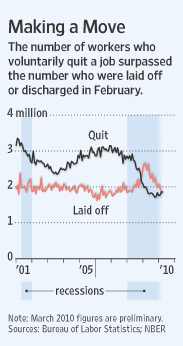An Alternative to Performance Reviews
Thursday, March 17th, 2011 Claims for unemployment benefits are dropping; the economy seems to be on the upswing again. And employers will be adding jobs each month, according to economists. Along with hiring new employees come the standard procedures like orientation, IRS forms and 30-day, 60-day and 90-day performance reviews.
Claims for unemployment benefits are dropping; the economy seems to be on the upswing again. And employers will be adding jobs each month, according to economists. Along with hiring new employees come the standard procedures like orientation, IRS forms and 30-day, 60-day and 90-day performance reviews.
But some experts say the initial and annual employee performance review is dead. Everyone dreads it, managers and employees alike. But human resources managers often think they are must-dos for legal reasons. After all, how can an employee be terminated without a paper trail?
It’s not the paper that’s the problem. Most people just think the reviews are not productive. They’re more about meeting a requirement with a process, and not about getting results. In short, they have little credibility—and everyone knows it. In fact, back in 2005, Psychology Today reported on a national survey by People IQ, which stated that a whopping 87 percent of managers and employees felt performance reviews were not useful or effective.
4 Ways to Improve on Annual Reviews
- Coach your employees every day. Setting objectives and goals together lets both employee and manager know what is expected. Weekly check-ins can help the employee keep on track toward reaching the goals, or switch things around as company needs change.
- Offer immediate feedback. Gen Y workers are used to hearing feedback. They were raised with it and don’t always thrive when kept in the dark about their performance.
- Eliminate the “annual” part. Monthly or quarterly one-on-one meetings with each staff member—without the “fill in the blank” forms—give both sides the opportunity to review performance, make plans for improvement and celebrate accomplishments.
- Give specifics. Instead of noting that an employee isn’t getting the job done, or seems distracted, offer specific examples of behavior that impacted the company negatively. Allow the employee to offer an explanation, then move on.
Employees are motivated to work hard, keep good jobs and contribute to a cause or company they believe in. Replacing annual reviews with setting goals and coaching employees to meet them, along with more frequent feedback might just be winning strategy for your company!









